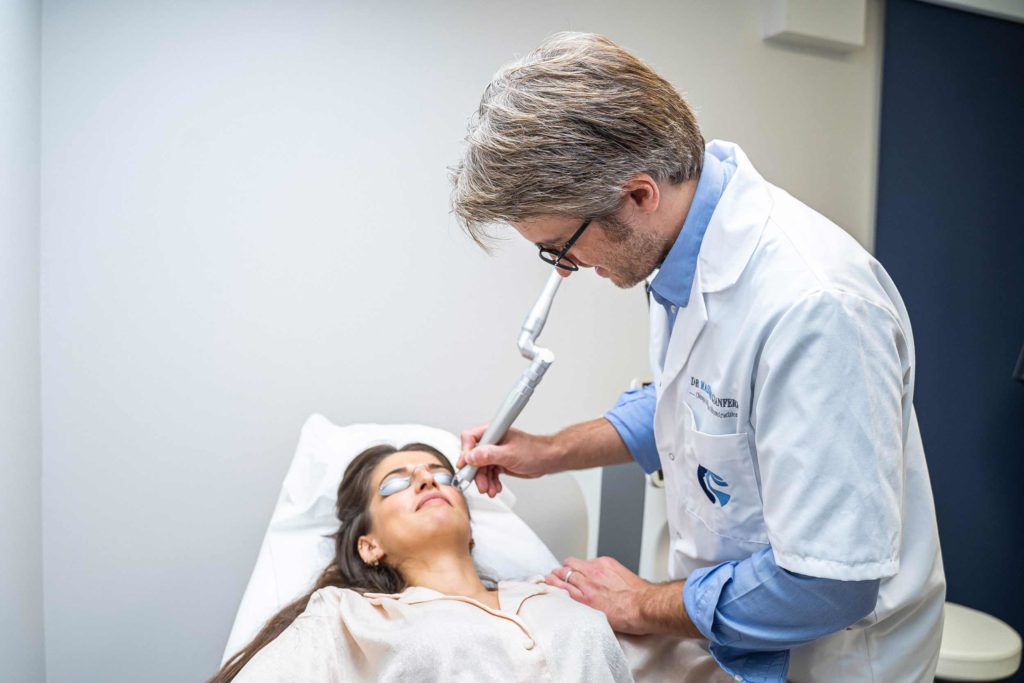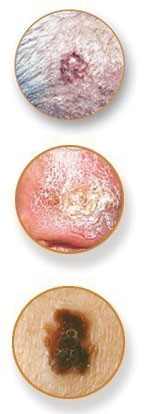Chirurgie Dermartologique
Le Dr Massimo Gianfermi et son équipe mettent à votre disposition leurs compétences et leur savoir-faire technique en matière de chirurgie dermatologique.
Introduction à la chirurgie dermatologique
La chirurgie dermatologique est une discipline médicale qui se consacre à la correction et au traitement des problèmes de peau. Elle englobe une large variété de procédures et de techniques, visant à améliorer l’apparence et la santé de la peau.

Les différentes procédures de chirurgie dermatologique
L'exérèse chirurgicale
L’exérèse chirurgicale est une procédure qui consiste à enlever une lésion cutanée, comme un grain de beauté, un kyste ou un carcinome. Cette intervention est souvent réalisée sous anesthésie locale et peut nécessiter une suture pour refermer la plaie.
La greffe de peau
La greffe de peau est une technique qui consiste à prélever une partie de la peau saine du patient et à la transplanter sur une zone endommagée. Cette procédure est souvent utilisée pour traiter les brûlures, les ulcères et les plaies importantes.
Le traitement au laser
Le traitement au laser est une procédure qui utilise des faisceaux de lumière concentrée pour cibler et détruire les cellules cutanées endommagées. Cette technique est utilisée pour traiter une variété de problèmes de peau, comme les cicatrices d’acné, les rides et les taches pigmentaires.
Le cancer de la peau
Le cancer de la peau correspond à la présence de cellules atypiques sur la peau. Il existe plusieurs types de cancers de la peau. Nombre d’entre eux sont liés à une exposition régulière et prolongée au soleil.
Avec son équipe de dermatologues, le Dr Gianfermi traite les trois principaux types de cancer de la peau :
- Le carcinome basocellulaire
- Le carcinome épidermoïde
- Le mélanome
Il traite également d’autres types de cancer de la peau.

Tâches de naissance, angiomes, tâches de vin, pigmentation de la peau
Bien qu’elles ne soient que rarement dangereuses, les tâches de naissance, les angiomes et les tâches de vin peuvent être source de complexes. Toutes ces affections sont dues à une pigmentation anormale de la peau sur certaines zones du visage ou du corps.
Le traitement peut comprendre une thérapie au laser et des soins à base de pommades topiques. Un dermatologue vous aidera à déterminer le plan de traitement personnalisé le mieux adapté à votre problème de pigmentation cutanée.
Renseignez vous sur la cartographie complète des grains de beauté !
Examen intégral du corps par dermoscopie de Foto Finder® : une perspective innovante
En dermatologie, l’inspection rigoureuse des lésions est cruciale pour leur diagnostic et suivi. Pendant des années, les praticiens se sont servis d’un dermoscope, une sorte de loupe grossissante.
Toutefois, les avancées de l’imagerie médicale haute définition associées aux algorithmes d’intelligence artificielle fournissent aujourd’hui des alternatives plus performantes, comme la dermoscopie corporelle totale intelligente de Total Body Dermoscopy.
Qu'est-ce que Foto Finder ATBM ?
Cette technologie combine l’imagerie médicale haute définition et des logiciels d’intelligence artificielle.
L’imagerie médicale comprend notamment :
- Une véritable dermoscopie vidéo ;
- Une image d’une très haute résolution ;
- Un flash au xénon, pour une lumière optimale sans ombre.
Les logiciels d’analyse renforcent l’analyse du clinicien :
- Bodyscan Master identifie les nouvelles lésions cutanées ou modifiées et les classe, permettant ainsi au praticien d’analyser prioritairement et de manière approfondie. Foto Finder Bodyscan présente les images avant/après sous le même angle, offrant un suivi très précis.
- Moleanalyser pro analyse les lésions principales et détermine un score prédictif grâce aux données d’intelligence artificielle.
Avantages et inconvénients de la chirurgie dermatologique

Avantage
- Amélioration de l’apparence de la peau
- Correction des imperfections cutanées
- Traitement des problèmes de peau
Avantage
- Risques liés à l’anesthésie
- Risques d’infection
- Récupération et cicatrisation
Comment choisir le bon praticien pour votre chirurgie dermatologique
Pour choisir le bon praticien pour votre chirurgie dermatologique, il est essentiel de rechercher un médecin qualifié et expérimenté. Voici quelques critères à prendre en compte :
Formation et qualifications
Assurez-vous que le médecin est diplômé d’une école de médecine reconnue et qu’il est spécialisé en dermatologie ou en chirurgie plastique.
Expérience
Il est important de choisir un praticien ayant une expérience significative dans la réalisation des procédures de chirurgie dermatologique qui vous intéressent.
Recommandations
Consultez les avis en ligne et demandez des recommandations à des amis ou à des membres de votre famille qui ont déjà subi des interventions similaires
Portfolio
N’hésitez pas à demander au praticien des exemples de son travail, comme des photos avant et après, pour vous faire une idée de ses compétences et de la qualité de ses résultats.
Ambiance et communication
Lors de votre consultation, assurez-vous de vous sentir à l’aise avec le praticien et de bien comprendre toutes les informations qu’il vous communique.
Comment choisir le bon praticien pour votre chirurgie dermatologique
Avant l'intervention
Il est important de bien se préparer avant une chirurgie dermatologique.
Voici quelques conseils pour vous aider :
- Discutez avec votre médecin de vos attentes et de vos préoccupations.
- Informez-le de vos antécédents médicaux et des médicaments que vous prenez.
- Évitez de fumer et de consommer de l’alcool avant l’intervention.
- Suivez les instructions de votre médecin concernant les soins préopératoires.
Après l'intervention
Le suivi postopératoire est crucial pour assurer une guérison optimale et des résultats satisfaisants. Voici quelques conseils pour vous aider après une chirurgie dermatologique :
- Suivez les instructions de votre médecin concernant les soins postopératoires.
- Évitez l’exposition au soleil et appliquez un écran solaire lorsque vous sortez.
- Ne forcez pas sur la zone traitée et évitez les activités physiques intenses pendant la période de récupération.
- Prenez les médicaments prescrits pour contrôler la douleur et prévenir l’infection.
- N’hésitez pas à consulter votre médecin si vous constatez des complications ou si vous avez des inquiétudes.
Conclusion
La chirurgie dermatologique est une discipline médicale en constante évolution, qui offre des solutions efficaces pour traiter et améliorer divers problèmes de peau.
En faisant appel à un praticien qualifié et en suivant les conseils de préparation et de suivi, vous pourrez bénéficier des nombreux avantages de ces interventions et obtenir des résultats satisfaisants.

About
Faites vous diagnostiquer
La détection précoce des cancers de la peau offre de meilleures chances de guérison et de survie, en particulier dans le cas des mélanomes cutanés.
En France, une journée nationale de dépistage des cancers de la peau est organisée chaque année, au mois de mai par le Syndicat national des dermatologues-vénérologues (Sndv). Un examen gratuit et anonyme est offert par des dermatologues partout en France.
La détection précoce d’un cancer de la peau survient suite à un examen médical, ou après que les patients aient détecté une lésion potentiellement suspecte : plaie qui ne cicatrise pas, bouton ou croûte qui persiste ou évolue, tache brune atypique, grain de beauté différent.
En moyenne, 100 000 cancers cutanés sont diagnostiqués chaque année.






